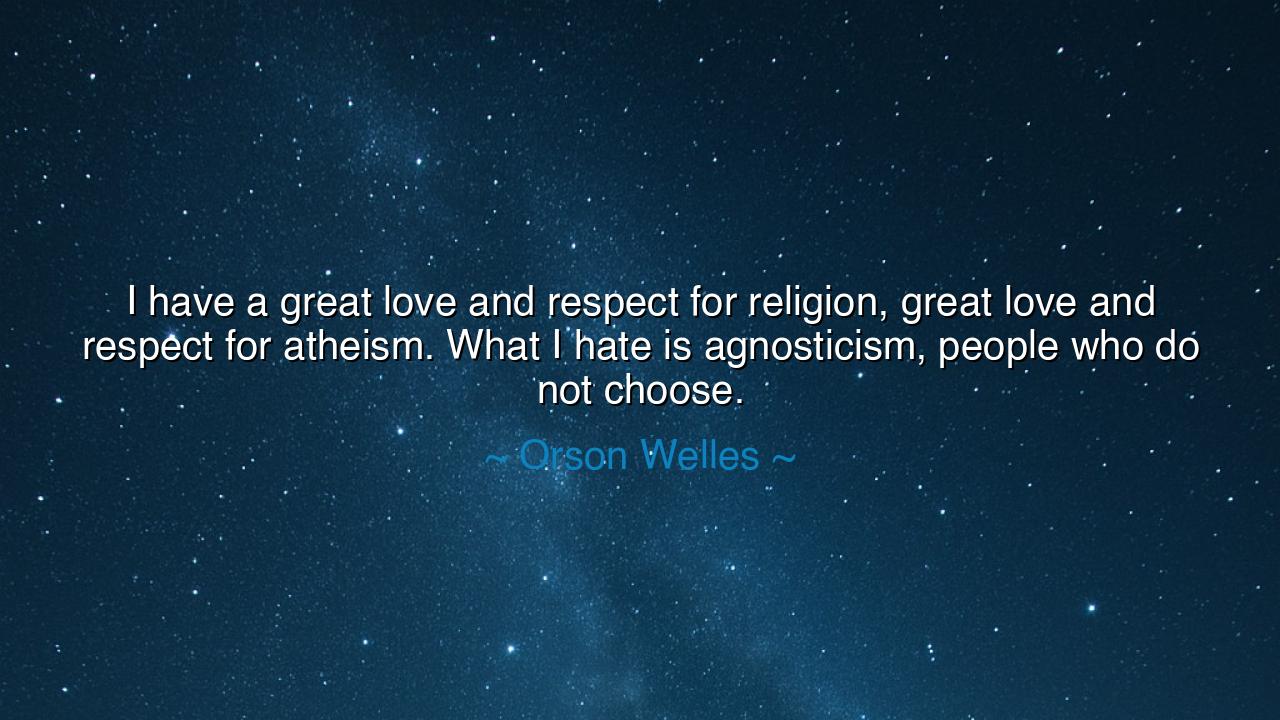
I have a great love and respect for religion, great love and
I have a great love and respect for religion, great love and respect for atheism. What I hate is agnosticism, people who do not choose.






"I have a great love and respect for religion, great love and respect for atheism. What I hate is agnosticism, people who do not choose." These words of Orson Welles strike deep at the heart of human belief and commitment. In them, Welles challenges us to confront the very nature of choice in matters of the spirit. Religion, with its sacred teachings and devotion, and atheism, with its rejection of the divine, both represent strong, well-defined paths in the journey of existence. But it is the agnostic, those who sit on the fence, neither committing to belief nor to disbelief, that Welles finds most troubling. In his view, agnosticism is a refusal to engage fully with the profound questions of life, a refusal to choose a path and take a stand.
At the core of Welles's words lies an impassioned belief in the power of choice. To him, the question of belief in the divine—whether it is a firm faith in religion or a decisive rejection of it—demands action. To choose one’s path, to take a side in the great cosmic debate of our existence, is not just a matter of personal conviction, but a moral and spiritual duty. Agnosticism, by contrast, represents a state of indecision, a refusal to make a stand, to seek answers in a world where answers are desperately needed.
Consider the ancient philosophers, who were unafraid to grapple with the great questions of existence. Socrates, though he did not provide definitive answers to the nature of the divine, did not shy away from the search for truth. He famously said, "The unexamined life is not worth living." This declaration was not a call to neutrality, but to a passionate search for understanding. He urged people to choose their beliefs carefully, to examine their hearts and minds, and to commit to the pursuit of knowledge and wisdom. In this way, Socrates shows us the value of a life spent in pursuit of clarity, even if that clarity leads us to uncomfortable or difficult truths.
Throughout history, we find figures who embraced their beliefs with intensity and clarity, whether in the form of religion or atheism. Martin Luther, in his great protest against the Catholic Church, made a choice to embrace a radical form of faith, one that challenged centuries of tradition and power. His 95 Theses shook the foundations of Europe and gave birth to the Protestant Reformation. Luther’s conviction was clear—he chose faith over doubt, and in doing so, he ignited a spiritual movement that reverberated through the ages. His was not a comfortable position, but one of uncompromising belief.
On the other side of the spectrum, consider the atheists like Friedrich Nietzsche, whose bold declaration that "God is dead" challenged conventional religious thought and championed a life without divine oversight. Nietzsche’s ideas, though controversial, were a declaration of intellectual independence, a refusal to submit to the religious dogma that dominated his time. He chose a path of individualism, one that rejected external authority in favor of self-determined meaning. Nietzsche’s stance, much like that of the deeply religious, was a call for authenticity and commitment in one’s beliefs.
But it is the agnostic—the one who neither believes nor disbelieves—who, in Welles’s eyes, stands at the center of the human drama without ever fully engaging in it. To refuse to choose is to abandon the responsibility that comes with belief, to retreat into a state of confusion and indecision. The agnostic may claim to be open-minded, but Welles would argue that true open-mindedness is not in the refusal to choose, but in the willingness to commit fully to one path, to live and die with the consequences of that choice.
The lesson here, then, is a call to action. We must not shy away from the great questions that define our existence. Whether we choose faith, reason, or something in between, we must choose with conviction and passion. We must not let the world’s uncertainties and contradictions paralyze us, but must stand firm in our beliefs, knowing that through commitment comes the power to shape our lives and our world. Indecision, while it may seem like an easy escape, only keeps us from the growth and clarity that come with a life fully lived.
Thus, let us reflect on Welles’s words: choose. Choose your path, choose your beliefs, and above all, choose to live with purpose and resolve. Whether we embrace religion or atheism, let our choices be driven by a desire for truth and meaning. The world needs not the indifferent or the non-committal, but the passionate and the engaged, those who are willing to face the great questions of existence with courage and clarity. The choice is yours, but it is a choice you must make.






AAdministratorAdministrator
Welcome, honored guests. Please leave a comment, we will respond soon